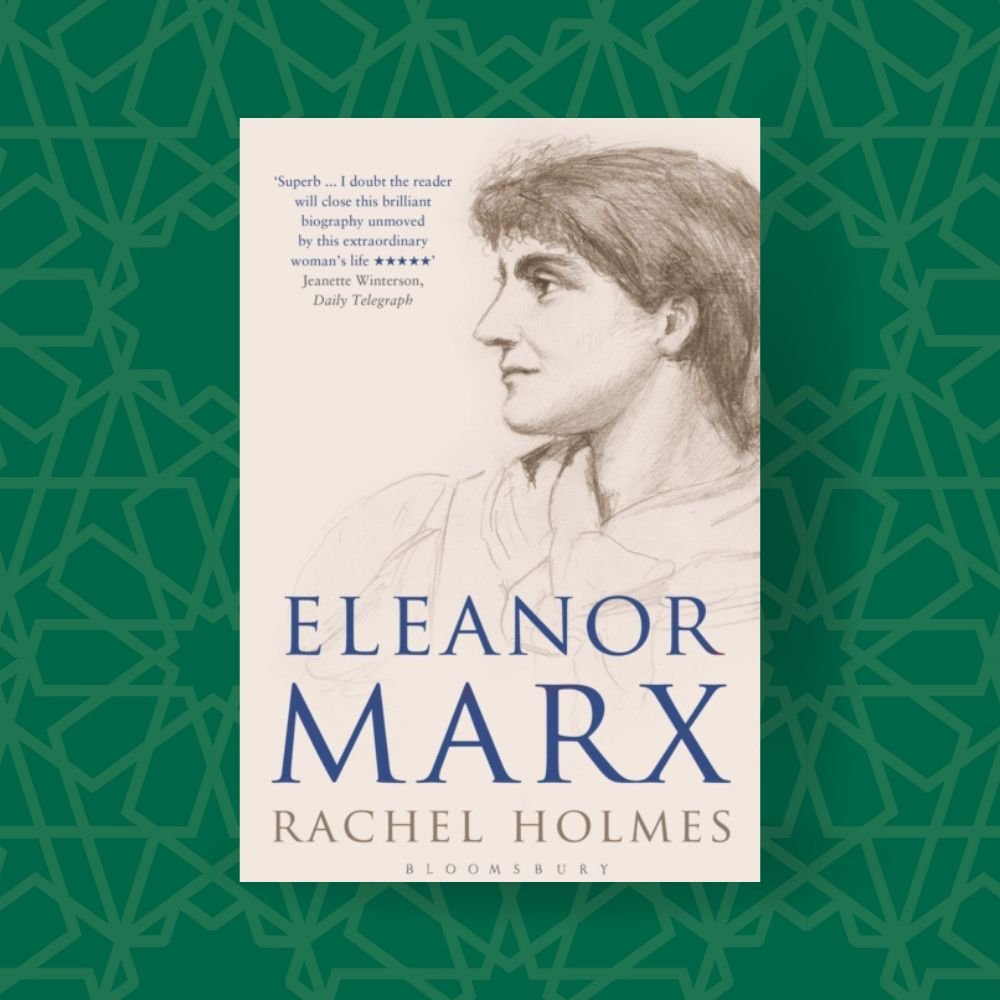Eleanor Marx by Rachel Holmes
signedpaperbackUnrestrained by convention, lion-hearted and free, Eleanor Marx (1855-98) was an exceptional woman. Hers was the first English translation of Flaubert’s Mme Bovary. She pioneered the theatre of Henrik Ibsen.
She was the first woman to lead the British dock workers' and gas workers’trades unions. For years she worked tirelessly for her father, Karl Marx, as personal secretary and researcher. Later she edited many of his key political works, and laid the foundations for his biography.
But foremost among her achievements was her pioneering feminism. For her, sexual equality was a necessary precondition for a just society. Drawing strength from her family and their wide circle, including Friedrich Engels and Wilhelm Liebknecht, Eleanor Marx set out into the world to make a difference - her favourite motto: 'Go ahead!’
With her closest friends - among them, Olive Schreiner, Havelock Ellis, George Bernard Shaw, Will Thorne and William Morris - she was at the epicentre of British socialism.
She was also the only Marx to claim her Jewishness. But her life contained a deep sadness: she loved a faithless and dishonest man, the academic, actor and would-be playwright Edward Aveling. Yet despite the unhappiness he brought her, Eleanor Marx never wavered in her political life, ceaselessly campaigning and organising until her untimely end, which - with its letters, legacies, secrets and hidden paternity - reads in part like a novel by Wilkie Collins, and in part like the modern tragedy it was.
Rachel Holmes has gone back to original sources to tell the story of the woman who did more than any other to transform British politics in the nineteenth century, who was unafraid to live her contradictions.
signedpaperbackUnrestrained by convention, lion-hearted and free, Eleanor Marx (1855-98) was an exceptional woman. Hers was the first English translation of Flaubert’s Mme Bovary. She pioneered the theatre of Henrik Ibsen.
She was the first woman to lead the British dock workers' and gas workers’trades unions. For years she worked tirelessly for her father, Karl Marx, as personal secretary and researcher. Later she edited many of his key political works, and laid the foundations for his biography.
But foremost among her achievements was her pioneering feminism. For her, sexual equality was a necessary precondition for a just society. Drawing strength from her family and their wide circle, including Friedrich Engels and Wilhelm Liebknecht, Eleanor Marx set out into the world to make a difference - her favourite motto: 'Go ahead!’
With her closest friends - among them, Olive Schreiner, Havelock Ellis, George Bernard Shaw, Will Thorne and William Morris - she was at the epicentre of British socialism.
She was also the only Marx to claim her Jewishness. But her life contained a deep sadness: she loved a faithless and dishonest man, the academic, actor and would-be playwright Edward Aveling. Yet despite the unhappiness he brought her, Eleanor Marx never wavered in her political life, ceaselessly campaigning and organising until her untimely end, which - with its letters, legacies, secrets and hidden paternity - reads in part like a novel by Wilkie Collins, and in part like the modern tragedy it was.
Rachel Holmes has gone back to original sources to tell the story of the woman who did more than any other to transform British politics in the nineteenth century, who was unafraid to live her contradictions.
signedpaperbackUnrestrained by convention, lion-hearted and free, Eleanor Marx (1855-98) was an exceptional woman. Hers was the first English translation of Flaubert’s Mme Bovary. She pioneered the theatre of Henrik Ibsen.
She was the first woman to lead the British dock workers' and gas workers’trades unions. For years she worked tirelessly for her father, Karl Marx, as personal secretary and researcher. Later she edited many of his key political works, and laid the foundations for his biography.
But foremost among her achievements was her pioneering feminism. For her, sexual equality was a necessary precondition for a just society. Drawing strength from her family and their wide circle, including Friedrich Engels and Wilhelm Liebknecht, Eleanor Marx set out into the world to make a difference - her favourite motto: 'Go ahead!’
With her closest friends - among them, Olive Schreiner, Havelock Ellis, George Bernard Shaw, Will Thorne and William Morris - she was at the epicentre of British socialism.
She was also the only Marx to claim her Jewishness. But her life contained a deep sadness: she loved a faithless and dishonest man, the academic, actor and would-be playwright Edward Aveling. Yet despite the unhappiness he brought her, Eleanor Marx never wavered in her political life, ceaselessly campaigning and organising until her untimely end, which - with its letters, legacies, secrets and hidden paternity - reads in part like a novel by Wilkie Collins, and in part like the modern tragedy it was.
Rachel Holmes has gone back to original sources to tell the story of the woman who did more than any other to transform British politics in the nineteenth century, who was unafraid to live her contradictions.






